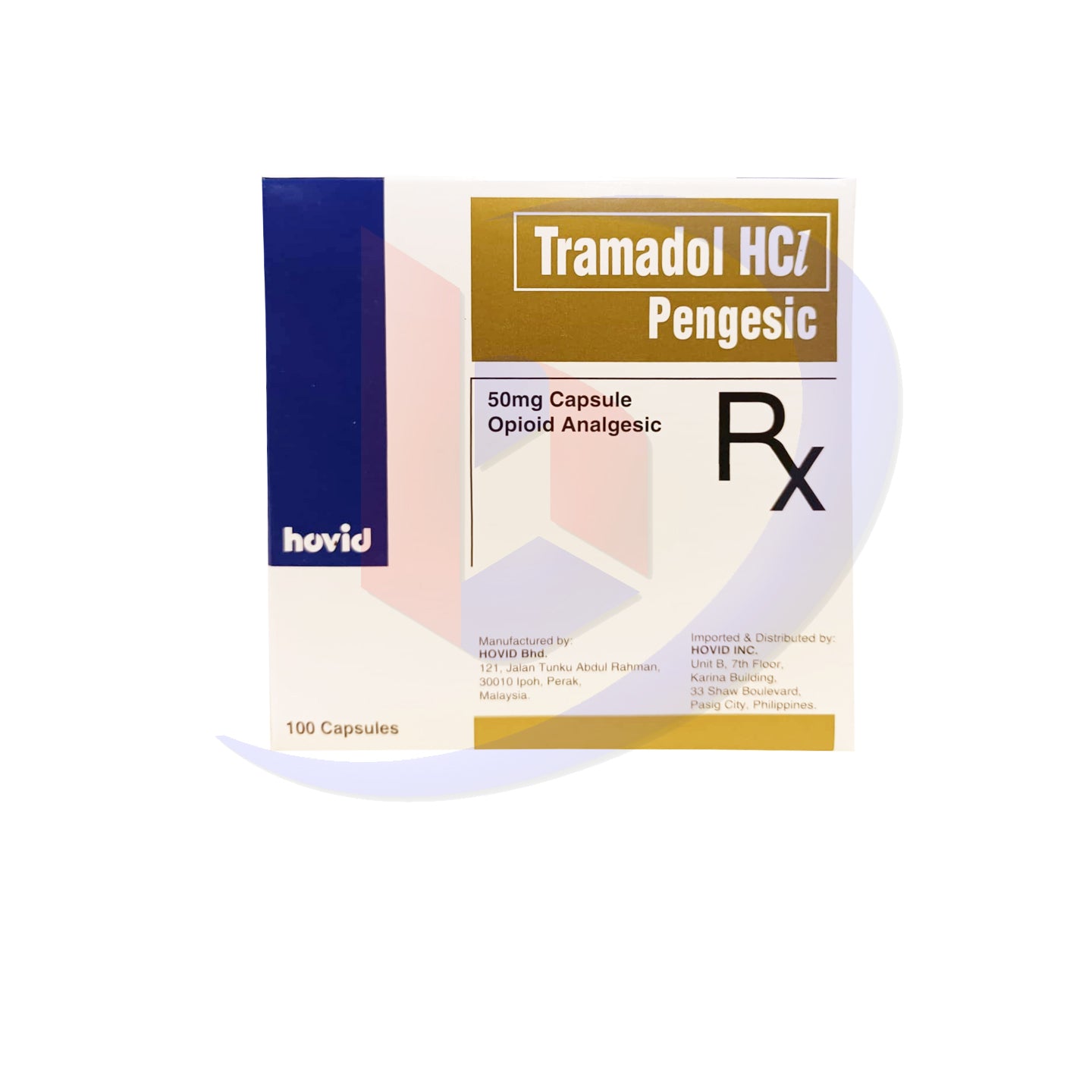Bambang Pharmaceutical Depot Inc.
Tramadol HCI (Pengesic) 50mg Opioid Analgesic Capsules 100's
Tramadol HCI (Pengesic) 50mg Opioid Analgesic Capsules 100's
Couldn't load pickup availability
Product Description:
Tramadol Hydrochloride (Pengesic) 50mg Capsules are a synthetic opioid analgesic used to relieve moderate to severe pain. Tramadol works by altering the way the brain and nervous system respond to pain, providing relief through its analgesic (pain-relieving) properties. Each capsule contains 50 mg of Tramadol Hydrochloride and is available in a pack of 100 capsules.
Tramadol is classified as a centrally acting analgesic, which means it works on the central nervous system to reduce the perception of pain. It has a dual mechanism of action: it binds to opioid receptors and inhibits the reuptake of serotonin and norepinephrine, making it effective for a wide range of pain types.
Indications:
Tramadol HCl (Pengesic 50mg) is indicated for the treatment of moderate to severe pain, including:
-
Acute Pain:
-
Post-surgical pain or trauma-related pain, such as pain following surgeries or injuries.
-
-
Chronic Pain:
-
For patients suffering from chronic pain conditions like osteoarthritis, rheumatoid arthritis, or lower back pain.
-
-
Cancer-related Pain:
-
Tramadol is often used as part of a multimodal approach to managing pain in cancer patients.
-
-
Neuropathic Pain:
-
Tramadol can be effective for conditions that cause nerve pain, such as diabetic neuropathy, postherpetic neuralgia, or fibromyalgia.
-
Dosage:
The dosage of Tramadol Hydrochloride (Pengesic) varies depending on the severity of the pain, the patient’s response to treatment, and their medical history. Below are the typical dosage guidelines:
For Adults:
-
Initial Dose: Typically, 50 mg to 100 mg (1 to 2 capsules) every 4 to 6 hours as needed for pain relief.
-
Maintenance Dose: The maximum recommended dose is 400 mg per day. This is usually divided into multiple doses (up to 8 tablets per day). It is important to not exceed 400 mg per day to avoid the risk of overdose and side effects.
-
For Chronic Pain: The doctor may adjust the dose based on the individual’s response and tolerance.
-
For Geriatric Patients (elderly): Reduced dosages may be recommended for older patients, especially those with kidney or liver impairment.
For Children:
-
Tramadol is generally not recommended for children under 12 years old, or under 18 years old for post-operative pain management following tonsillectomy or adenoidectomy due to the risk of serious side effects.
Renal or Hepatic Impairment:
-
Patients with renal (kidney) or hepatic (liver) impairment may require lower doses or extended dosing intervals.
Side Effects:
As with any medication, Tramadol (Pengesic) can cause side effects. Some of these are mild, while others may require medical attention.
Common Side Effects:
-
Drowsiness or sedation.
-
Dizziness, lightheadedness, or feeling faint.
-
Constipation.
-
Nausea or vomiting.
-
Dry mouth.
-
Sweating or flushing.
Serious Side Effects:
-
Respiratory Depression: Slow or shallow breathing, especially if the drug is misused or taken in high doses.
-
Severe Allergic Reactions: Symptoms may include rash, itching, swelling of the face, lips, or throat, and difficulty breathing (anaphylaxis). Immediate medical attention is needed.
-
Seizures: Tramadol can lower the seizure threshold and increase the risk of seizures, particularly if taken in high doses or combined with certain medications.
-
Serotonin Syndrome: When combined with serotonergic drugs (like antidepressants), serotonin syndrome may occur, characterized by agitation, hallucinations, fever, rapid heart rate, changes in blood pressure, hyperreflexia, and muscle rigidity.
-
Dependence and Withdrawal Symptoms: Tramadol is an opioid, and long-term use can lead to physical dependence and withdrawal symptoms if the medication is abruptly discontinued.
-
Liver Damage: In rare cases, liver toxicity may occur, especially in those with existing liver conditions.
Other Side Effects:
-
Mood changes or irritability.
-
Headache.
-
Fatigue or weakness.
-
Changes in appetite or weight loss.
-
Visual disturbances (blurred vision).
Contraindications:
Tramadol HCl (Pengesic) should be avoided or used with caution in the following situations:
-
Hypersensitivity to Tramadol or Opioids:
-
Contraindicated in individuals who have an allergy to Tramadol, opioids, or any component of the medication.
-
-
Acute or Severe Respiratory Depression:
-
Contraindicated in patients with severe respiratory depression, particularly those with chronic obstructive pulmonary disease (COPD) or sleep apnea.
-
-
Severe Liver or Kidney Disease:
-
Not recommended for patients with severe hepatic (liver) dysfunction or renal (kidney) failure unless under strict medical supervision, as Tramadol is metabolized and excreted by these organs.
-
-
Concurrent Use with MAO Inhibitors (Monoamine Oxidase Inhibitors):
-
Tramadol should not be used concurrently with MAO inhibitors (a class of antidepressants) or within 14 days of stopping them due to the risk of serotonin syndrome.
-
-
Children Under 12 Years:
-
Tramadol is contraindicated in children under 12 years old, particularly for the treatment of pain after surgery such as tonsillectomy or adenoidectomy due to the increased risk of respiratory depression.
-
-
Pregnancy and Breastfeeding:
-
Tramadol is categorized as Pregnancy Category C. It should be used in pregnancy only if clearly needed and after careful evaluation of the benefits and risks. Tramadol is excreted in breast milk and can pass to the infant, so it should be used cautiously or avoided while breastfeeding.
-
-
Severe CNS Depression or Coma:
-
Contraindicated in patients with conditions of severe CNS depression, such as coma or head injury, due to the risk of exacerbating respiratory and neurological depression.
-
-
History of Seizures:
-
Tramadol lowers the seizure threshold, and therefore, it is contraindicated in individuals with a history of seizures or those with epilepsy.
-
Precautions:
-
Caution in Elderly: Elderly patients may have a higher risk of side effects such as dizziness, confusion, and sedation. Lower doses may be required.
-
CNS Depressants: Tramadol should be used cautiously when combined with other CNS depressants (e.g., benzodiazepines, alcohol, or antidepressants), as it can lead to enhanced sedation, respiratory depression, and overdose.
-
Monitoring: Liver function and renal function should be monitored regularly in patients with liver or kidney disease, as Tramadol is metabolized and excreted by the liver and kidneys.
-
Dependence and Withdrawal: Long-term use of Tramadol may lead to physical dependence, tolerance, and withdrawal symptoms upon discontinuation. Gradual tapering of the dose is recommended if discontinuing the medication.
Drug Interactions:
Tramadol can interact with several other medications, including:
-
Serotonergic Drugs (e.g., SSRIs, SNRIs, TCAs, MAO inhibitors):
-
Increases the risk of serotonin syndrome, a potentially life-threatening condition.
-
-
CNS Depressants (e.g., benzodiazepines, opioids, alcohol):
-
Increased risk of sedation, respiratory depression, and overdose.
-
-
Anticonvulsants (e.g., carbamazepine, phenytoin):
-
These medications can lower the effectiveness of Tramadol by increasing its metabolism.
-
-
Anticoagulants (e.g., warfarin):
-
Tramadol may interact with warfarin and alter its anticoagulant effects, increasing the risk of bleeding.
-
Conclusion:
Tramadol HCl (Pengesic) 50mg Capsules are effective for managing moderate to severe pain. However, it is important to use them cautiously due to the potential for dependence, respiratory depression, and interactions with other medications. Careful adherence to the prescribed dosage, and close monitoring for any side effects, especially in vulnerable populations, is essential. Always consult your healthcare provider before starting or discontinuing Tramadol therapy.
Share

Product Features
Highlights
Details
Lot #
Expiry Date
"For All Your Pharma And Medical Supply Needs"
-
MEDICINES
We offer large range of generics and branded tablets, capsules, topicals, suppositories, drops or suspensions, inhalers and injections.
-
SUPPLEMENTS
High quality yet very affordable vitamins and minerals, specialty supplements, herbals and botanicals, sports nutrition, and weight management.
-
MEDICAL SUPPLIES
We serve all types of medical supplies needed in clinics, laboratories, and hospitals like cottons, gauze, alcohol, swabs, gloves, bandages, lancets, glucometer, etc.
-
MEDICAL EQUIPMENT
We also serve durable and affordable medical devices and equipment needed in clinics, laboratories and hospitals.
Subscribe to our emails
Be the first to know about new collections and exclusive offers of Bambang Pharmaceutical Depot Inc.


